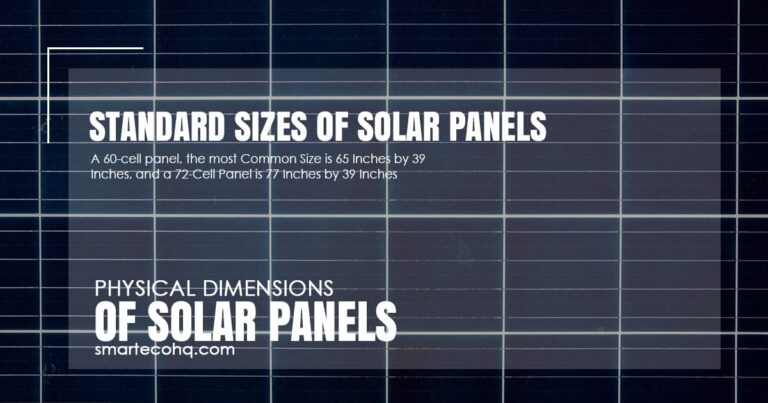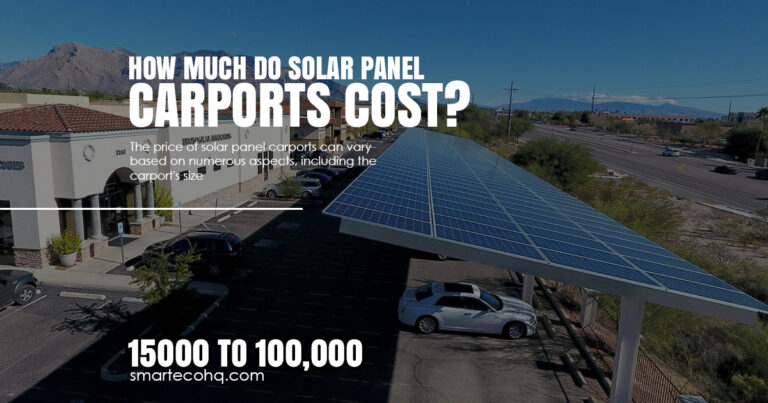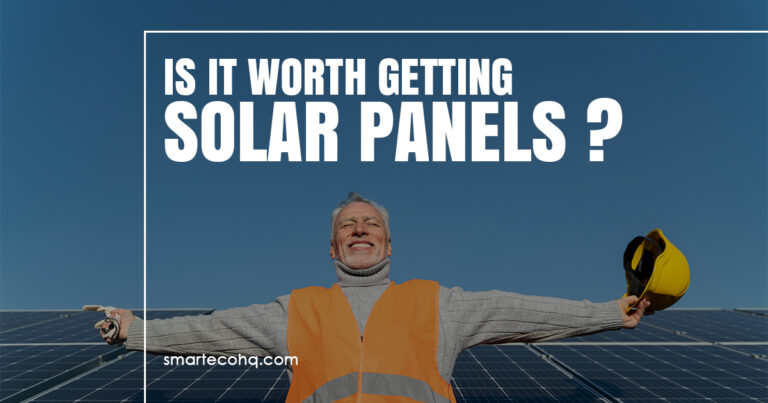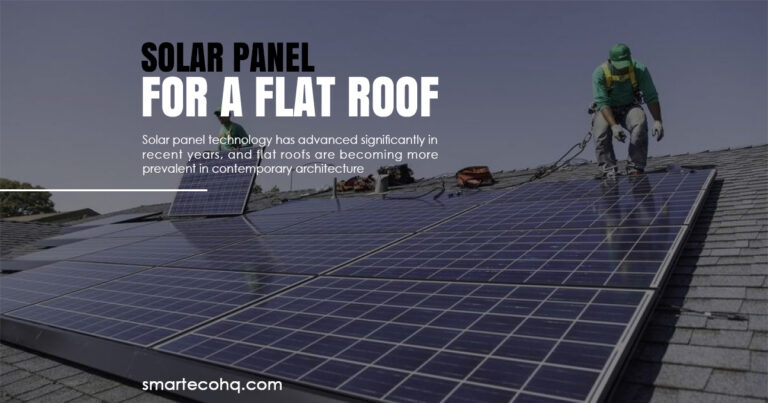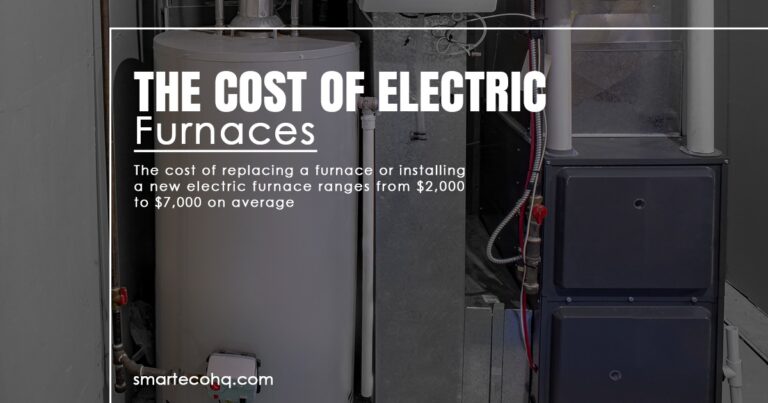What are the pros and cons of solar energy?

Are you interested in using free and eco-friendly energy to power your house or business? You must have heard of solar energy, but are you aware of the advantages and disadvantages of solar energy? Knowledge of benefits and drawbacks of Solar energy is a must to know part before solar panel system installation.
Solar energy is a promising option for clean and sustainable electricity. Solar energy will surely create a world in which clean, renewable energy is within our reach. Before going solar, it is important to understand its potential benefits and drawbacks. Let’s discuss the advantages and disadvantages of solar energy to make an informed decision.
What is solar energy?
Solar energy is collected in two ways: solar panels and solar thermal collectors. Solar panels, also known as photovoltaic (PV) panels, generate electricity through a process known as the photovoltaic effect. The panels are made up of many solar cells that contain semiconducting materials.
In addition, when sunlight strikes these cells, photons (light particles) transfer their energy to the electrons in the material, allowing them to flow and generate an electric current. The inverter’s work begins here; it converts direct current (DC) electricity into alternating current (AC) power, making it compatible with standard household or commercial electrical systems.
The Pros and Cons of Solar Energy
Here are some common pros and cons of installing a solar power system:
| Pros of Solar Energy | Cons of Solar Energy |
|---|---|
| Renewable Energy | Initial Cost |
| Saves Electricity Bills | Weather Dependant |
| Low Maintenance | Space Requirement |
| Cost Effective | Not Portable |
| Increase Property Value | |
| Eco-Friendly | |
| The Great Investment |
Pros of Solar Energy:
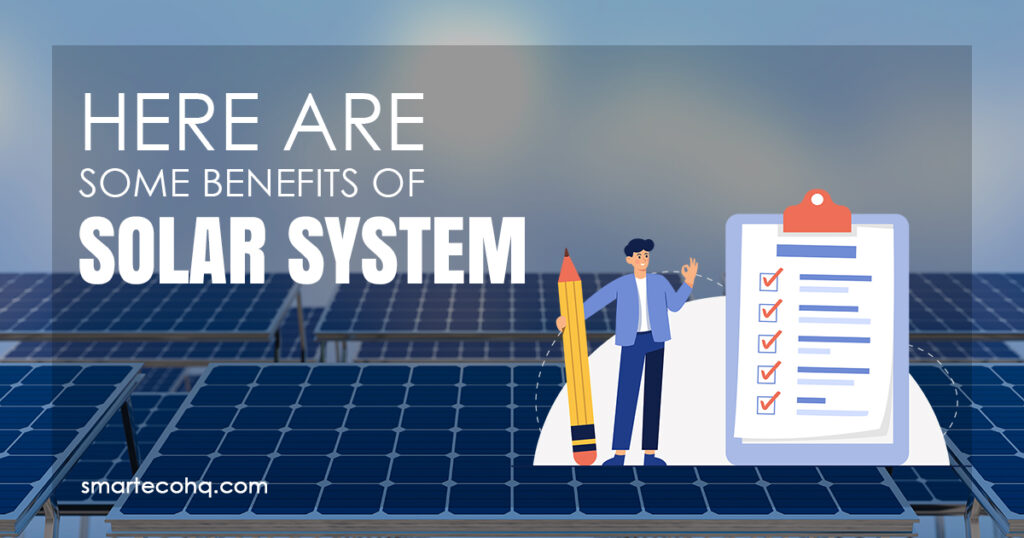
Renewable Energy Source:
The sun is the main source of energy, and it provides energy in all parts of the world every day. It can’t turn out as long as the sun shines.
It is a renewable source of energy that the sun continuously regenerates, just as surely as night follows day. Unlike other fuels such as coal and oil, which are finite and will eventually run out, solar energy is renewable and will never be depleted.
Save On Electricity Bills:
The best pros of Solar energy that you will get are that it can result in significant savings on your electricity bills. You meet the majority of your electricity needs with solar systems, such as powering your home or running your industry or business.
By using the energy generated by the Solar system, you can see a certain amount of reduction in your electricity bills. This reduction also depends on the size of your solar system and the amount of energy you use. Excess energy can also be sent back to grid stations, lowering electricity costs even further.
Low-Maintenance:
Did you know that the maintenance of solar panels is like eating a piece of cake? You just have to keep an eye on the cleanliness of the panels to avoid getting dust and debris layered on them.
Furthermore, all you have to do after a while is check the inverter and wiring, and if there is any damage, contact an expert. Also, they have no moving parts, so there are fewer chances for things to go wrong. So maintenance could be among both the pros and cons of solar panels.
Another benefit of solar panels is that they come with a warranty of 25–30 years, but with proper maintenance, they can go for up to 40 years.
Cost Effective:
Also, the long-term savings on electricity bills make it a cost-effective investment for you. You can benefit from free electricity for many years after purchasing your solar panels.
Furthermore, many governments and organizations provide incentives and rebates for switching to solar power, making it even more affordable.
Increase Property Values:
To add to your knowledge, the National Renewable Energy Laboratory estimates that every dollar you save on electricity bills as a result of solar adds $20 to the value of your home. A building’s beauty and cost will rise if it includes solar panels, so the owners will ultimately save money.
In addition, according to a study conducted by the Lawrence Berkeley National Laboratory, homes with solar panels sell for 4.1% more than homes without them.
Eco-Friendly:
Another advantage to consider is that solar energy is a clean and environmentally friendly source of energy, as it generates electricity without emitting harmful pollutants. Also, it is a renewable energy source that reduces carbon footprints, conserves natural resources, and requires less land use.
Life cycle analyses have revealed that solar energy systems have a lower environmental impact than traditional fossil fuel-based energy systems.
Great Investment:
You can also expect a significant return on your investment in solar panels over time. Solar panels offer a reliable source of electricity at a fixed cost, generating free energy and offering cost savings over time. One of the best advantages of solar energy is that it is a great investment.
With a long lifespan, they can continue to save money for years and Protect homeowners against Future Increases in Electricity Prices. Solar panels are a smart long-term investment.
Cons Of Solar Energy:
As everything in this world is somewhere right and somewhere wrong, so are the solar panels. Along with all the benefits mentioned above, the following are some cons of solar energy.
Initial Cost:
The most well-known pros and cons of solar power are the high initial cost of installation and purchase. The cost of solar panels represents a significant investment for many households and businesses.
However, the long-term benefits of solar energy can outweigh the initial costs over time, resulting in significant energy bill savings. Also, now the government is offering several incentives and financing options that can lessen the initial cost burden.
Weather-Dependent:
The Production of solar energy is dependent on weather conditions, particularly sunlight. It means they may not produce the desired energy on overcast days or in the winter when there is less sunshine. It is important to remember that every cloud has a silver lining.
In these instances, you might need to depend on a backup energy source. However, advancements in solar technology, such as the use of energy storage systems, can help address this issue.
Space Requirement:
Installing solar panels requires a significant amount of space. Some people might find it difficult to install a solar system according to their energy needs. This can be a challenge for urban areas or places with limited available space.
However, rooftop and Yard solar installations can help address this issue, as they utilize unused space on rooftops and yards.
Not portable:
A big con of Solar panel systems is that they are not portable. These solar panels are typically installed on rooftops, in yards, or in solar farms and are designed to provide a long-term, stationary source of renewable energy.
Moreover,They are intended to generate electricity for on-site use rather than transporting it to other locations for temporary power solutions. Small portable solar panels, on the other hand, are becoming increasingly popular and can come in handy in a variety of situations.
Conclusion:
To summarize the discussion about the pros and cons of solar energy, it should be known to you if you are considering installing solar panels that Solar energy has many advantages that make it an attractive renewable energy source. It is environmentally friendly, long-lasting, lowers reliance on fossil fuels, and more, as discussed above.
However, there are several disadvantages, such as initial installation costs, unreliable nature, and the requirement for sufficient equipment, that are minor compared to the advantages.
Solar energy’s overall benefits make it an essential component of the worldwide transition to a cleaner, more sustainable energy future.
FAQs
Q 1. Is solar panel Maintenance a DIY job?
Solar panels require only minor maintenance, such as cleaning and checking inverters and wiring on a regular basis. So you can manage it yourself.
q 2. Are Solar Panels Expensive?
The initial cost of installing solar panels is high, but when weighed against the benefits, it is comparable to a growing tooth in your mouth. Governments, on the other hand, offer numerous incentives and funding to alleviate this burden.
q 3. Are there any tax breaks for solar panels?
Yes. The federal solar investment tax credit, which was established in 2006, offers a 26% tax credit for solar panels installed on residential and commercial properties.


